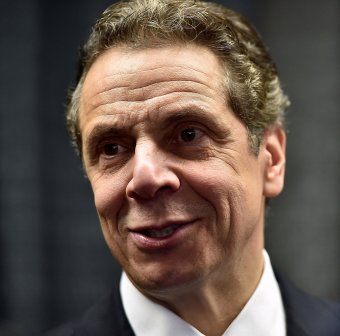
New York's long-awaited assessment on the health and climate consequences of fracking found that safety uncertainties have mounted over time. The study formed the basis of Gov. Andrew Cuomo's decision late last year to ban the practice in the state. Credit: governorandrewcuomo, flickr
New York issued its long-awaited environmental assessment of fracking Wednesday detailing a wide range of health and climate concerns that underpinned Governor Andrew Cuomo's decision last December to impose a statewide ban on the practice.
High-volume hydraulic fracturing "raises new, significant, adverse impacts not studied" in the state's last major analysis of oil and gas development in 1992, the 2,000-page report concludes. The negative effects that fracking could bring to the state include:
— Air impacts that could affect respiratory health due to increased levels of particulate matter, diesel exhaust or volatile organic chemicals.
— Climate change impacts due to methane and other volatile organic chemical released into the atmosphere.
— Drinking water impacts from underground migration of methane and/or fracturing fluid chemicals associated with faulty well construction or seismic activity.
— Surface spills potentially resulting in soil, groundwater and surface water contamination.
— Surface water contamination resulting from inadequate wastewater treatment.
— Earthquakes and creation of fissures induced during the hydraulic fracturing stage.
— Community impacts such as increased vehicle traffic, road damage, noise, odor complaints,and increased local demand for housing and medical care.
Issued by the Department of Environmental Conservation, the "Final Supplemental Generic Environmental Impact Statement" took more than six years to produce, as public comments on drafts and the burgeoning literature on the various effects of fracking led to repeated revisions of the study.
The assessment notes that considerable uncertainty over the adverse environmental and public health consequences of fracking has "grown worse over time."
Industry, for example, has long asserted that fracking fluid has never migrated to or tainted underground drinking water, but documented cases have revealed drinking water contamination from fracking. A study this month in the Proceedings of the National Academy of Sciences found the presence of chemicals used in fracking fluids in the drinking water of three Pennsylvania households. State regulators also detected methane in the families' water. Similarly, leakage rates into the atmosphere of methane, a powerful greenhouse gas that could wipe out the climate benefit of natural gas, remain unclear as major studies only now get underway.
In New York, the resistance to fracking grew as residents saw the effects of the gas boom across the border in Pennsylvania. New York localities, such as the village of Dryden, created fracking bans that withstood court challenges adding momentum to activist efforts for a statewide prohibition.
New York is the first state with substantial natural gas reserves to ban fracking. Others, such as North Carolina, placed moratoria on the practice that they eventually lifted. Some, such as Vermont, have bans in place that are mostly symbolic as they have minimal oil and gas reserves.
Using industry projections, the report estimated that New York could have received more than 1,600 applications a year on average from drillers to use fracking to develop gas reserves in the Marcellus and Utica shale formations. That rate of activity could have extended over a 30-year period, the report said.
Within ten days of the report's publication, by May 23, the state's Environmental Conservation Commissioner must issue the final decision on the fracking ban, according to New York regulations. The ban is not permanent, however, and could be reversed by a future administration.
© InsideClimate News
http://insideclimatenews.org/news/15052015/why-did-ny-ban-fracking-official-report-now-public